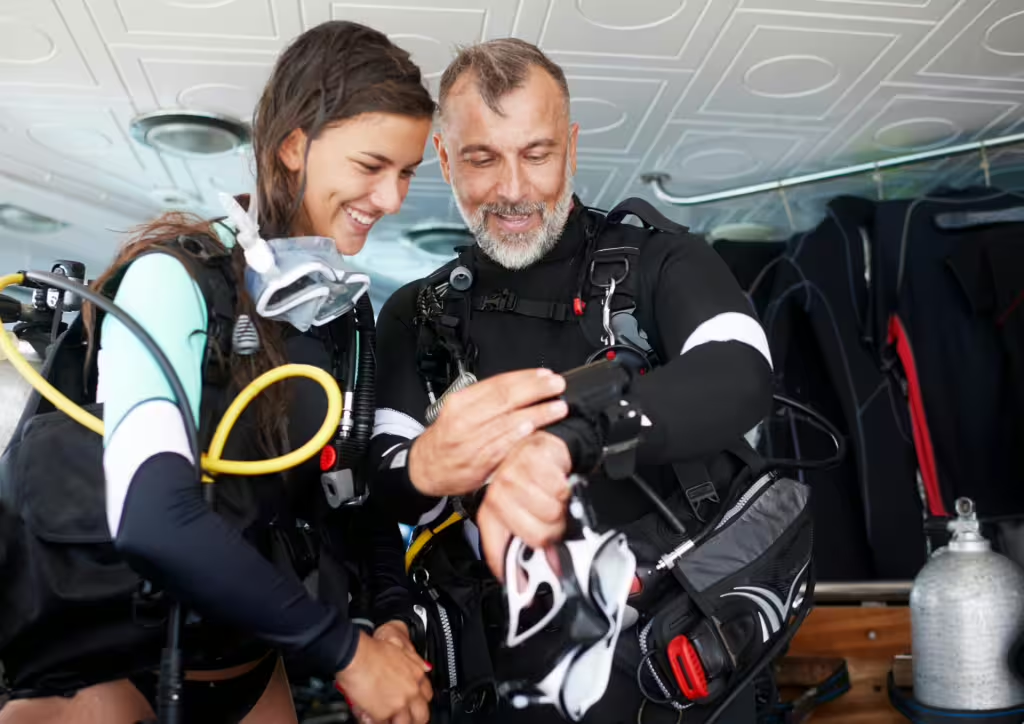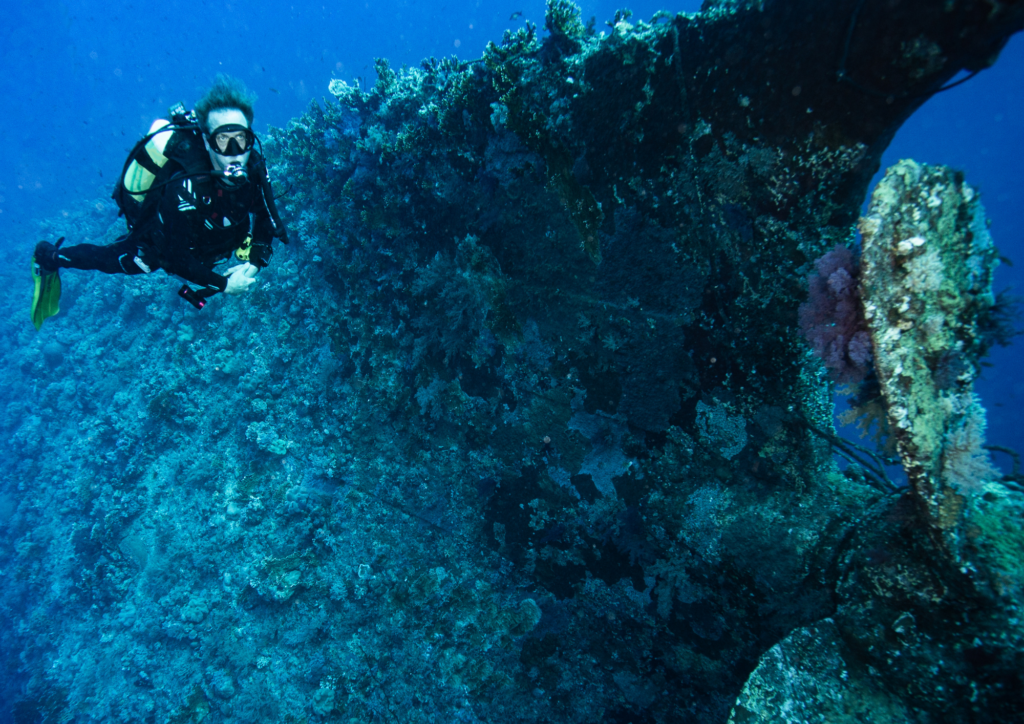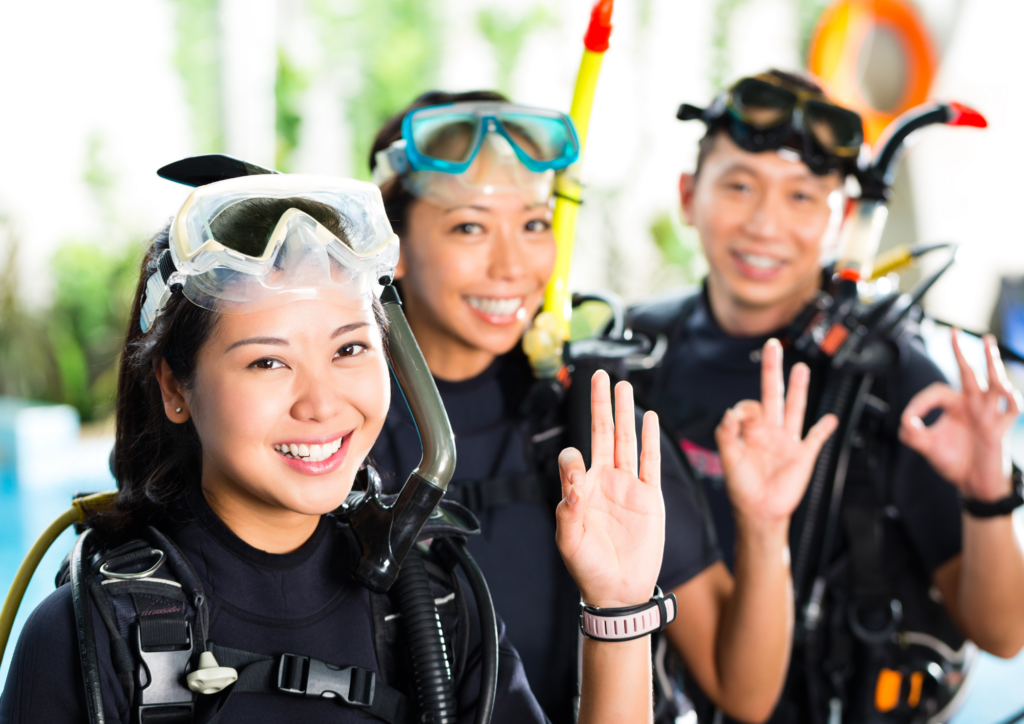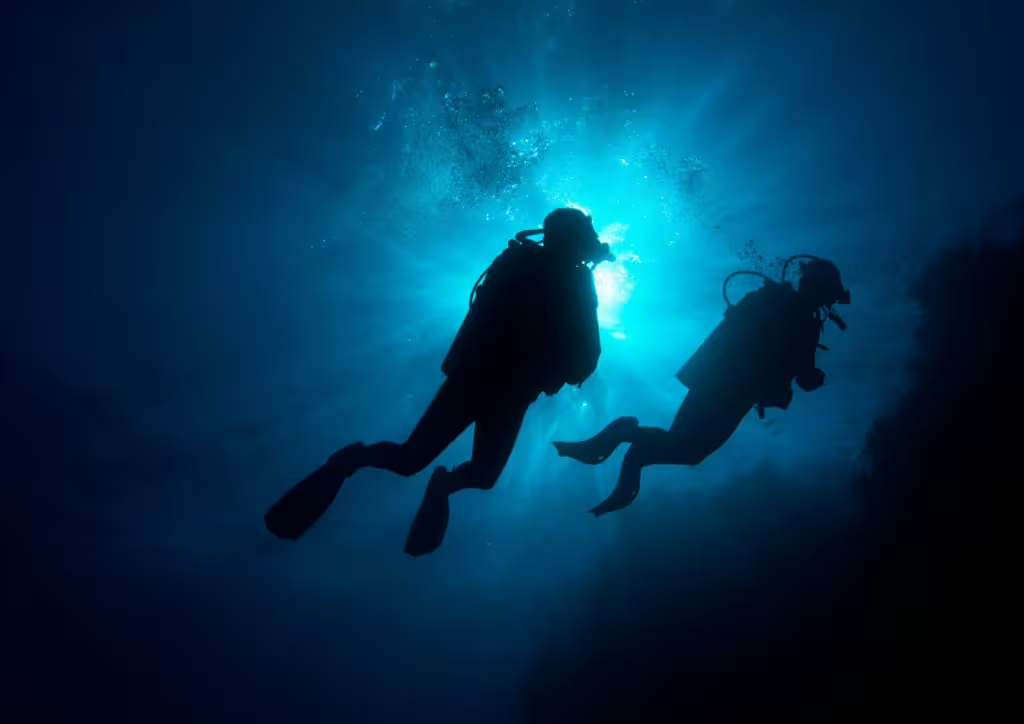Bali Diving Course options open the door to Bali’s vibrant underwater world, making the choice of certification agency crucial. PADI and SSI, both globally recognized, offer top-notch training for unforgettable adventures. Explore the key differences between these agencies to make the best choice for your Bali Diving Course.
Overview of PADI and SSI Certifications
When it comes to scuba diving certifications, PADI (Professional Association of Diving Instructors) and SSI (Scuba Schools International) are the two most recognized agencies worldwide. PADI is renowned for its structured courses and vast network of dive centers, making it an attractive option for divers looking to explore Bali.
With its global reach and considerable number of instructors, many divers appreciate the standardized training and reputation that comes with a PADI course. Their certification process emphasizes safety and consistency, ensuring learners are well-equipped for underwater exploration. On the other hand, SSI focuses on a more personalized learning experience, allowing instructors greater flexibility to tailor courses to their students’ needs.
SSI is often praised for its emphasis on diving philosophy and skills mastery, which can foster a deeper connection to the underwater environment. In Bali, where the diversity of marine life is unparalleled, this approach may provide divers with a more engaging experience. Ultimately, choosing between PADI and SSI for your Bali diving course depends on your learning preferences, but both agencies offer robust training that can lead to fulfilling underwater adventures.
Key Differences in Training Approaches
When considering a Bali Diving Course, understanding the key differences in training approaches between PADI (Professional Association of Diving Instructors) and SSI (Scuba Schools International) is crucial. PADI typically follows a more structured, systematic approach, emphasizing standardized training materials and methods.
This is beneficial for those who prefer a consistent experience across multiple locations and instructors. PADI’s courses are often perceived as more formal, with a focus on assessments and examinations to gauge a diver’s proficiency before progressing to more advanced levels. This rigorous approach can benefit beginners looking for a clear path to certification.
In contrast, SSI offers a more flexible, personalized learning experience that prioritizes hands-on practice and environmental awareness. SSI training encourages instructors to adapt to a divers’ unique learning styles and paces, making it an appealing choice for those who enjoy a more relaxed, explorative approach to learning.
Their emphasis on environmental conservation and dive site familiarity can enhance the diving experience, especially in stunning locations like Bali. Ultimately, the choice between PADI and SSI will depend on personal preferences regarding structure, flexibility, and the specific learning environment one seeks in their diving adventure in Bali.
Course Structure and Flexibility

When selecting between PADI and SSI for your Bali diving course, understanding the course structure is crucial. PADI, being the most widely recognized scuba diving certification agency globally, has a structured approach that covers core practical skills. Their courses typically follow a linear format, progressing through beginner levels to advanced, ensuring a comprehensive understanding of diving principles.
PADI courses often boast a robust support system and extensive resources, which can be incredibly beneficial for first-time divers. On the other hand, SSI offers a more flexible learning environment. Its modular structure allows students to pick and choose their learning path, accommodating varying paces and styles.
This flexibility means that you can spend more time on practical skills or theoretical understanding based on your individual needs, making it an attractive option for those who may feel overwhelmed by traditional approaches. Another point to consider is the integration of online learning. SSI is known for its digital tools, providing students with interactive online courses that facilitate learning at their own convenience, perfect for those planning their itinerary while in Bali.
PADI also offers online components but tends to emphasize in-water training. By weighing these two approaches, you can determine which course structure aligns with your personal preferences and learning style, ensuring you get the most out of your Bali diving course experience.
Instructor Qualifications and Experience
When considering a Bali diving course, instructor qualifications and experience are paramount. Both PADI (Professional Association of Diving Instructors) and SSI (Scuba Schools International) pride themselves on having highly trained instructors, yet their training paths may differ slightly. PADI instructors must complete a rigorous set of courses and examinations, ensuring they are well-versed in diving safety and education.
This guarantees that the instructors have an extensive knowledge base and practical experience to guide divers of all levels safely and effectively. On the other hand, SSI instructors emphasis quality over quantity, often focusing on longer internships and real-world teaching experiences. This hands-on training fosters a depth of understanding that can enhance the quality of instruction and the overall diving experience.
Choosing the right instructor can significantly impact your Bali diving course, where the dive site conditions and marine biodiversity are spectacular. Ensuring your instructor is not only certified by a reputable agency but also has ample experience in the local dive sites is essential.
Instructors familiar with diving in Bali can offer valuable insights, helping you to navigate unique underwater ecosystems and optimize your dive experience. Thus, taking the time to research the qualifications and experiences of instructors within both PADI and SSI programs can provide you with peace of mind and enhance your overall diving journey in enchanting Bali.
Availability and Accessibility of Courses in Bali

When choosing between PADI and SSI for your Bali diving course, availability and accessibility of courses play a crucial role. Bali is a paradise for divers, boasting a plethora of diving schools that offer both PADI and SSI certifications. PADI courses tend to be more widely offered, with numerous instructors and facilities geared towards their curriculum.
This means that whether you’re a complete beginner or an advanced diver looking to refine your skills, you’re likely to find a PADI course that meets your needs at a convenient location. Increased availability can sometimes mean more flexible scheduling options, allowing you to dive when it suits you best during your vacation.
On the other hand, SSI is also gaining popularity in Bali, with numerous dive centers embracing their philosophy of quality over quantity. SSI advocates for a more personalized training experience, often leading to smaller class sizes and more hands-on instructor time.
While you may find fewer SSI centers compared to PADI, the dive schools that offer SSI courses often focus on an immersive experience, showcasing Bali’s breathtaking underwater world. Ultimately, the decision may hinge on your personal preferences regarding instructor interaction, course availability, and the overall diving experience you wish to have in Bali.
Community and Support Networks
When considering your Bali Diving Course, the community and support networks associated with each certification agency can greatly enhance your learning experience. PADI, being one of the largest diving organizations globally, offers a vast network of instructors, dive shops, and divers. This extensive community means you can easily find support, resources, and camaraderie, both during your course and in your future diving adventures.
Their active online forums and local dive clubs provide a platform for connecting with fellow divers, sharing experiences, and gaining insights into the best dive spots in Bali and beyond. On the other hand, SSI also boasts a strong community, emphasizing training quality and a close-knit atmosphere. Their instructors often prioritize personalized education, leading to a more supportive environment during your Bali Diving Course.
SSI’s decentralized approach allows dive centers to foster their own communities, resulting in a more intimate diving experience. Many divers appreciate this personal touch, as it encourages a collaborative spirit among students and instructors alike. Ultimately, whether you lean towards PADI or SSI, understanding the community and support networks can help you choose a program that resonates with your diving aspirations.
Cost Considerations for Your Diving Course

When it comes to selecting a Bali diving course, cost is a significant factor that many aspiring divers must consider. Both PADI (Professional Association of Diving Instructors) and SSI (Scuba Schools International) courses come with varying price tags, influenced by several elements such as the type of certification, duration of the course, and included amenities like gear rental and accommodation.
Generally, PADI tends to be slightly more expensive than SSI due to its widespread recognition and global certification system. However, many dive shops in Bali offer competitive pricing for both options, and individuals should evaluate what each course offers in terms of value for money, especially if they plan to dive frequently in the future.
Budget-conscious divers may find that SSI often provides more inclusive packages, making it a compelling choice for those looking to keep costs down without skimping on quality training. Moreover, prospective divers should also consider the potential for hidden costs that may arise from both certification paths.
For example, the price of course materials, insurance, and extra dives are essential factors that can add to the overall expense. It’s beneficial to request a detailed breakdown of costs from different dive schools in Bali, allowing for a thorough comparison. Additionally, some dive shops may offer promotions or discounts that can make one certification route more affordable than the other.
By thoroughly investigating these cost considerations, you can make a more informed decision about whether PADI or SSI aligns best with your financial plans while ensuring a rewarding diving experience in Bali.
Choosing the Right Agency Based on Your Goals
When choosing between PADI and SSI for your Bali Diving Course, it’s essential to consider your personal diving goals and how each agency aligns with them. PADI, the world’s largest diving organization, is well-known for its standardized training and extensive network of dive centers globally. If you’re planning to pursue diving not just in Bali but worldwide, PADI might offer you greater flexibility and recognition.
Their courses are designed for a variety of levels and interests, which can cater to both recreational divers and those seeking to make diving a professional career. On the other hand, SSI focuses on providing a more personalized learning experience with a greater emphasis on local dive sites and conservation. If your main goal is to dive specifically in Bali and engage deeply with its marine environment, SSI’s approach could better fit your needs.
They prioritize diver safety, environmental stewardship, and practical experience, which can enhance your overall diving skills and awareness. Understanding your personal goals—whether it is global travel or local expertise—will help you choose the right agency for your diving course in Bali.
Making the Right Choice for Your Bali Diving Experience
In conclusion, choosing between PADI and SSI for your Bali Diving Course ultimately depends on your individual preferences, learning style, and diving goals. Both organizations offer reputable certifications, comprehensive training, and diverse courses that cater to different levels of experience. It’s essential to evaluate the specifics of each program, including the course structure, available dive sites, and instructor qualifications, to determine which approach resonates more with your expectations and aspirations as a diver.
Moreover, consider the environment and community that each certification offers, as immersing yourself in a supportive diving culture can enhance your experience significantly. Whether you choose PADI or SSI, your time spent diving in Bali will undoubtedly be unforgettable, providing you with incredible memories and a deeper appreciation for the underwater world. Embrace the journey, and happy diving!


As a certified diver myself, I think it’s essential to consider the flexibility of the course and the impact on the environment. SSI seems like a great choice for someone who wants to explore more, but what about the PADI courses in specific locations?
Thank you for sharing your thoughts, Siti Fatimah Ramli. You raise a valid point about flexibility in diving courses, and SSI’s emphasis on environmental conservation is indeed a significant factor for many divers. Regarding PADI’s courses in specific locations, we recommend checking their website or contacting their support team to inquire about the availability of courses in Bali. Additionally, it would be helpful to know more about your previous diving experiences and what you’re looking to achieve in your next diving course. Please feel free to contact us at [email protected] or call us at +62 857 3891 8262 for further guidance.
This is really helpful for beginners who want to choose between PADI and SSI, but can the author provide more insights into the pricing and instructor experiences?
Thank you for your comment, Syuan Ling Lai! We’re glad you found our blog helpful. Regarding the pricing and instructor experiences, we recommend reaching out to the diving centers and resorts directly in Bali for the most up-to-date and accurate information. Additionally, you can visit the official websites of PADI and SSI to learn more about their certification programs, course costs, and instructor bios. For more information about Eko Life Malaysia, you can contact us via email at [email protected] or give us a call at +62 857 3891 8262. We’ll be happy to help you find a suitable diving program that fits your needs and budget.
This blog has done a great job at providing a balanced view on the pros and cons of PADI and SSI, but I wish the author could weigh in on which certification is more popular among tourists in Bali.
Thank you for your thoughtful comment! I’m glad you appreciated the balanced view of PADI and SSI. Unfortunately, there isn’t a single definitive answer to which certification is more popular among tourists in Bali, as it often depends on various factors such as budget, diving level, and personal preferences. However, many of our customers have indeed opted for PADI certifications, which might indicate a slight edge for PADI in terms of popularity. That being said, I’d recommend checking with local diving schools or websites like SSI’s or PADI’s official resources for more accurate and up-to-date information. Feel free to reach out to us at [email protected] or +62 857 3891 8262 for any further assistance.